GO TO: MONDAY: LISTENING |
TUESDAY: SMELLING |
WEDNESDAY: SEEING |
HOLY THURSDAY: TOUCHING |
GOOD FRIDAY: TASTING |
EASTER SATURDAY: USING ALL OUR SENSES
Each week in Parish Life our scripture reflections are brought to you by St Beuno’s Outreach in the UK. This year, St Beuno’s has put together a special reflection for Holy Week. It is reproduced below. Please note, however, that not all the daily lectionary readings are the same in the southern hemisphere.
St Ignatius suggests that we can use our senses to aid our prayer, and so to come to know the Lord more intimately.
Each day this week, we invite you to focus mostly on just one of your senses as you accompany the Lord during his last days (though of course, if the Spirit so guides, you may find yourself drawing on others). There is a range of Scriptural texts and images to help, complemented by lines from two poems by the Irish poet, priest and philosopher John O’Donohue (1956–2008): ‘A Blessing for the Senses’, included in Anam Cara: Spiritual Wisdom from the Celtic World (1996, repr. 2021), and ‘For the Senses’, in To Bless the Space Between Us: A Book of Blessings (2007). During the evening, when you review what has happened during the day, you may also like to recall specific moments where your senses played an important part in your prayer, whether positively or negatively. You may wish to share these with the Lord, and listen to him respond.
USING OUR SENSES
‘Of all the ways of praying recommended by St Ignatius, using our senses is probably the most baffling. . . . It is a way of getting out of our heads and going deeper into the perceptions, feelings and promptings which take place when we pray.
It helps to think how often we refer to bodily sensations in order to describe a powerful and instinctive reaction: “I had a gut feeling”, “I found that hard to swallow”, “It took my breath away”. We incarnate within our bodily sensations some of our strongest responses, and in the Gospel we see Jesus doing the same. Being present to Jesus as he acts through his own bodily senses, we come to share more deeply in his human experience and self-understanding.
Early on in the Spiritual Exercises, St Ignatius remarks that it is not complex thinking and theological speculating that will bring about a change in us, but “sensing and tasting things interiorly” (Sp Exx §2): looking, listening, savouring, relishing and embracing what we contemplate. . . . The process we undergo of deepening our spiritual, intellectual and sensate familiarity with him changes the way we perceive and experience reality.’
Adapted from Gemma Simmonds CJ ‘Making sense of the application of the senses’, Thinking Faith, March 2018
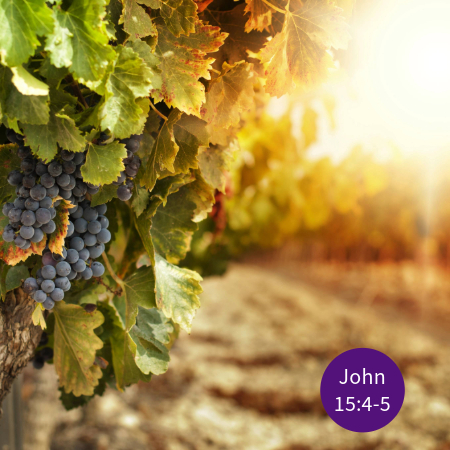 MONDAY: LISTENING
MONDAY: LISTENING
‘Make your home in me, as I make mine in you. As a branch cannot bear fruit all by itself, but must remain part of the vine, neither can you unless you remain in me.
I am the vine, you are the branches. Whoever remains in me, with me in them, bears fruit in plenty; for cut off from me you can do nothing.’
– John 15: 4–5
REFLECTION
At the beginning of this Holy Week, I may be full of good resolutions. Perhaps I am determined to spend quality time each day with Jesus, as he goes to his Passion. But on some days it may be that life gets in the way, and I can only snatch a few minutes. Even so, I know – and Jesus knows – that my desire is there.
When I do find a few moments to pray, I put aside all the demands made on me, and I try to come to some inner quiet. Maybe I take a few deep breaths and then breathe normally; I close my eyes or focus on one object which reminds me of the Lord: a cross, my Bible, a favourite image, a candle.
When I am ready, I slowly and prayerfully read the Scripture for today. These are the words of Jesus, speaking to his disciples shortly before his Passion. He is speaking to me too. I listen to him. What is his voice, his accent, like?
How do I feel as I hear Jesus telling me that he wants to make his home in me? Perhaps I focus on the sounds around Jesus as he speaks to me. I hear the rustle of the disciples’ garments, the shuffling of feet, the clearing of throats.
How important is it to hear Jesus tell me that I cannot bear fruit unless I remain in him? Perhaps I remember times when he was there, present within me, at key moments of my life, even if at the time I was unaware of that.
I may want to speak to Jesus, to explain how I came to realise that ‘cut off from him I could do nothing’. I may also feel the need to ask him to help me be a better listener. As I close my prayer, I give thanks in gratitude for having been able to listen to the Lord, trusting that he, in turn, listens to me.
May your listening be attuned
To the deeper silence
Where sound is honed
To bring distance home.
– John O’Donohue, ‘For the Senses’
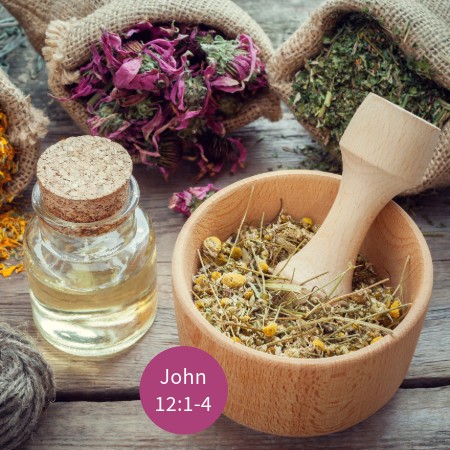 TUESDAY: SMELLING
TUESDAY: SMELLING
Six days before the Passover, Jesus went to Bethany, where Lazarus was, whom he had raised from the dead. They gave a dinner for him there; Martha waited on them and Lazarus was among those at table. Mary brought in a pound of very costly ointment, pure nard, and with it anointed the feet of Jesus, wiping them with her hair; the house was full of the scent of the ointment
– John 12: 1–4
REFLECTION
As I come to the place where I will pray today, I take time to settle my body. I become aware of where I am sitting: the feel of the chair, my back supported and my feet in contact with the floor. I turn my attention to my breathing, letting it find its own rhythm as I relax. In my own time I turn to the scripture passage and read it slowly a number of times.
I may like to imagine the happy scene as the friends prepare to welcome Jesus into their home. Perhaps there is the scent of fragrant spices, freshly baked bread, the heady aroma of wine? What do I notice about Jesus as he settles down among them?
Maybe I recall occasions from my own life where the smell of the food I’ve prepared draws everyone round the table . . . or perhaps a barbecue . . . or other smells may trigger memories? The fragrance of a meadow or newly mown grass . . . or perhaps I remember a perfume worn by someone special to me, or perhaps once wore? I savour these, aware of what arises for me.
Returning to the house at Bethany, I notice what happens as the fragrance of the ointment envelops the room when Mary enters. How does Jesus react as Mary anoints him and wipes his feet with her hair? How do I respond?
Perhaps the scene evokes for me other times in Jesus’s life where my sense of smell was particularly awakened. I may think of the gifts brought by the kings for the infant Jesus . . . the raising of Lazarus from his tomb ... the fish cooking on the coals beside the sea of Tiberias . . . or something else? I ponder.
There may be something I want to say to the Lord now, or perhaps it’s enough just to remain in his presence. When I’m ready, I may like to end by thanking the Lord for all the memories – happy or sad – that this time of prayer has given me.
May the fragrance
Of a breathing meadow
Refresh your heart
And remind you you are
A child of the earth.
– John O’Donohue, ‘For the Senses’
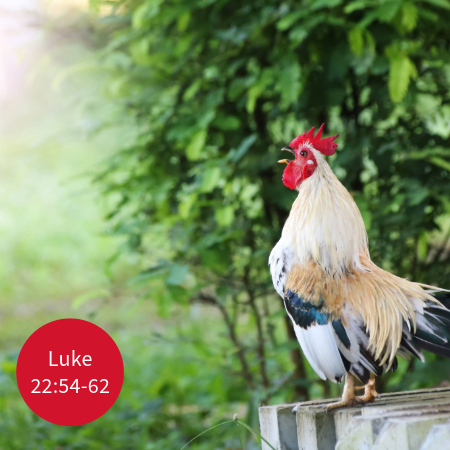 WEDNESDAY: SEEING
WEDNESDAY: SEEING
They seized Jesus then and led him away, and they took him to the high priest’s house. Peter followed at a distance. They had lit a fire in the middle of the courtyard and Peter sat down among them, and as he was sitting there by the blaze a servant-girl saw him, peered at him, and said, ‘This person was with him too’. But Peter denied it. ‘Woman,’ he said ‘I do not know him.’ Afterwards someone else saw him and said, ‘You are another of them’. But Peter replied, ‘I am not, my friend’.
About an hour later another man insisted, saying, ‘This fellow was certainly with him. Why, he is a Galilean.’ ‘My friend,’ said Peter ‘I do not know what you are talking about.’ At that instant, while he was still speaking, the cock crew, and the Lord turned and looked straight at Peter, and Peter remembered what the Lord had said to him, ‘Before the cock crows today, you will have disowned me three times’. And he went outside and wept bitterly.
– Luke 22: 54–62
REFLECTION
I gently become still, and turn my attention to the Lord who welcomes me with love and joy. As I enter into this familiar story, perhaps I focus on what Peter feels as the bystanders point him out. What makes him deny Jesus? Fear . . . cowardice . . . uncertainty . . . or . . .? What do I notice as Jesus looks directly at Peter?
Jesus now looks straight at me. If I can hold his gaze, how does it feel? What does he want to say to me? Is there something I need to say to him? Perhaps, though, I find it hard to let Jesus look at me. What gets in the way? Perhaps I’m afraid ... or feel unworthy ... or something else? I share with him what I’m feeling.
I consider my life now. How well do I see the needs of people around me? Maybe sometimes I’m tempted to avert my eyes from those who are hungry, thirsty, lonely or sick. I ponder. Perhaps I can also recall how it felt during those times when I didn’t look away, but saw the Lord in someone and responded with a compassionate look, a smile or a greeting?
I may want to close my prayer today asking for the graces I need to always see Jesus more clearly, love him more dearly and follow him more nearly.
May your inner eye
See through the surfaces
And glean the real presence
Of everything that meets you.
– John O’Donohue, ‘For the Senses’
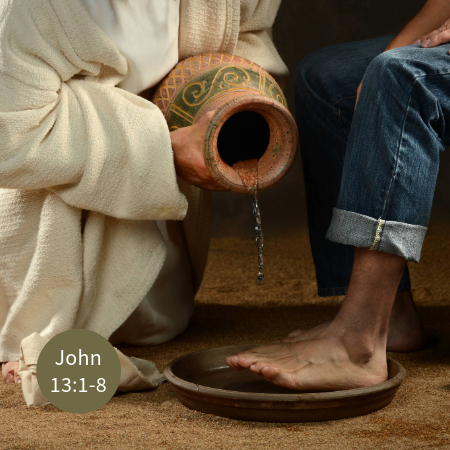 HOLY THURSDAY: TOUCHING
HOLY THURSDAY: TOUCHING
Jesus had always loved those who were his in the world, but now he showed how perfect his love was. They were at supper, and the devil had already put it into the mind of Judas Iscariot son of Simon, to betray him. Jesus knew that the Father had put everything into his hands, and that he had come from God and was returning to God, and he got up from table, removed his outer garment and, he then poured water into a basin and began to wash the disciples’ feet and to wipe them with the towel he was wearing. He came to Simon Peter, who said to him, ‘Lord, are you going to wash my feet?’ Jesus answered, ‘At the moment you do not know what I am doing, but later you will understand’. ‘Never!’ said Peter, ‘You shall never wash my feet.’ Jesus replied, ‘If I do not wash you, you can have nothing in common with me’.
– John 13: 1–8
REFLECTION
I take a few slow, deep breaths, breathing in God’s loving welcome for me. When I am ready, I slowly read the passage before me, and join Jesus and the disciples in the upper room.
How do I feel as I see Jesus kneel before each of the disciples and wash and dry their feet? What comes to mind as I recall witnessing, or maybe even taking part, in our re-enactment of this act of humble service in the memorial of the Last Supper we celebrate today?
What is it like as Jesus now kneels before me? Perhaps, like Peter, I’m reluctant? If so, I tell Jesus what I feel. What does he say to me about this?
If I’m able to respond to Jesus’s invitation, perhaps I relish the feel of the water trickling over my feet ... the caress of his hands as he dries them. What do I feel now? Maybe I recall the joy of offering God’s compassion and love myself by reaching out with a hug or a comforting hand? Or perhaps at times I wanted to embrace or touch someone, and yet I held back?
I ponder, and, in time, I speak to the Lord as one friend to another, ending my prayer with gratitude for this precious time together.
May the touch of your skin
Register the beauty
Of the otherness
That surrounds you.
– John O’Donohue, ‘For the Senses’
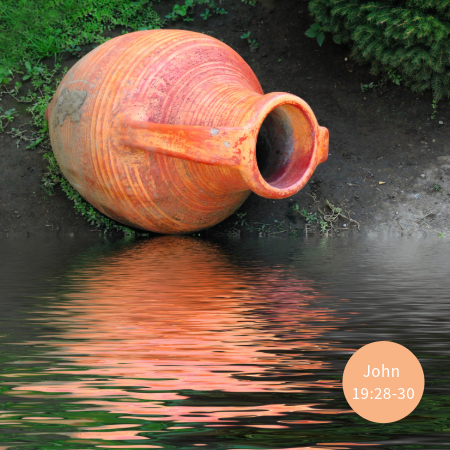 GOOD FRIDAY: TASTING
GOOD FRIDAY: TASTING
After this, Jesus knew that everything had now been completed, and to fulfil the scripture perfectly he said: ‘I am thirsty’. A jar-full of vinegar stood there, so putting a sponge soaked in the vinegar on a hyssop stick they held it up to his mouth. After Jesus had taken the vinegar he said, ‘It is accomplished’; and bowing his head he gave up his spirit.
– John 19: 28–30
REFLECTION
And so, finally, the end is here. Throughout this week, I have listened to Jesus, breathed in the powerful scent of the ointment on his feet, met his gaze, and felt the touch of his hands on my own feet. Today I prepare myself to spend some time with him as he suffers and dies on the cross for me.
As I have done every day this week, I settle down and try to put aside anything that prevents me from being still. I read the text slowly, a few times, pausing where I am drawn. Perhaps what strikes me is that right to the end, Jesus is aware that he is part of a greater divine plan, and yet it is his humanity which comes to the fore: ‘I am thirsty’. I pause awhile.
I consider the soldiers giving Jesus vinegar. Why did they do this? Maybe I can imagine being one of them. Perhaps I am the person who brought the jar. I know what vinegar tastes like, I can feel its acid bitterness on my tongue, on my lips. It is one thing I can share with Jesus. Maybe the liquid helped moisten his dry mouth.
Perhaps at this stage I am tempted to leave, finding the situation too hard to bear. I may need to ask the Father for the strength to remain here, wordlessly suffering with Jesus to the bitter end. Eventually, as I conclude my prayer, bowing my head, I make a slow sign of the cross: I shall attempt to continue to live my life: In the name of the Father, and of the Son and of the Holy Spirit. Amen.
And when you partake
Of food and drink
May your taste quicken
To the gift and sweetness
That flows from the earth.
– John O’Donohue, ‘For the Senses’
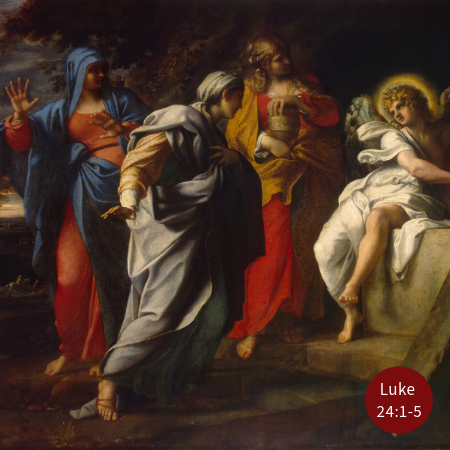 HOLY SATURDAY: USING ALL OUR SENSES
HOLY SATURDAY: USING ALL OUR SENSES
On the first day of the week, at the first sign of dawn, the women who had come from Galilee with Jesus went to the tomb with the spices they had prepared. They found that the stone had been rolled away from the tomb, but on entering discovered that the body of the Lord Jesus was not there. As they stood there not knowing what to think, two men in brilliant clothes suddenly appeared at their side. Terrified, the women lowered their eyes. But the two men said to them, ‘Why look among the dead for someone who is alive? He is not here.
– Luke 24:1–5
REFLECTION
After the intensity of yesterday’s events, I may find it difficult to come to prayer today. Jesus’s words, ‘It is accomplished’, are so final, and perhaps still ring in my ears. Maybe all I feel like doing today is to sit quietly with the Lord, re-living his last hours.
Nevertheless, in time I take a few deep breaths, and look at the text which has been chosen for me today. Slowly, I come to realise that these women will have been just as upset as I am. Yet here they are, intent on doing what little they can for their Lord.
As I try to visualise the scene, I may find the scent of the spices, the roughness of the stone, the brilliance of the clothing of the two men, the sound of their voices, make the scene come alive and help me. I ponder. Maybe the bitter taste which had been in my mouth is gradually disappearing.
Like the women, I may not know what to think. Yet my senses are not deceiving me: He is not here. Can he really be alive, as the men say? Is there a light at the end of this dark tunnel? Once again I ponder and eventually speak to the Father. I tell him what is in my heart, my uncertainties, my hopes and desires. I listen to him, trusting his words to be reassuring and comforting.
Perhaps this leads me to recall all those around me or further afield who are unable to believe that the light shines in darkness, and the darkness cannot overcome it. I pray for them, before closing my prayer with a grateful sign of the cross.
May your body be blessed.
May you realise that your body is a faithful
and beautiful friend of your soul.
And may you be peaceful and joyful
and recognise that your senses
are sacred thresholds.
– John O’Donohue, ‘A Blessing for the Senses’
Image: Holy Women at Christ's Tomb (c. 1590s). Annibale Carracci (1560-1609). Oil on canvas, 121 x 146 cm (47.6 x 57.4 in). Hermitage Museum, St. Petersburg. In Matthew 28:1–10, Mary Magdalene and "the other Mary" encounter an angel at the tomb, who tells them that Christ has risen. Hermitage Museum.